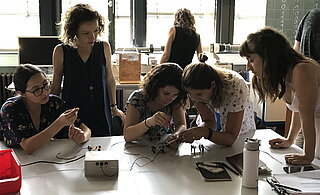New Online Course on Energy Efficiency in Buildings

German and Turkish universities have jointly developed an online certificate course on energy efficiency in buildings.
Buildings account for a considerable share of total energy demand and greenhouse gas emissions. In Germany alone, buildings account for 30 percent of all CO2 emissions according to the Federal Environment Agency (UBA). At the same time, urbanisation is increasing worldwide, resulting in a massive demand for new buildings, especially in emerging countries like Turkey.
Many residents are unaware that operation costs of buildings are higher than planning and construction costs in comparison and over its entire lifetime.To reduce CO2 emissions as well as operation and construction costs in the building sector, buildings must be planned, constructed and operated in a more energy efficient manner. If the full potential of energy efficient buildings should be tapped, this needs a supportive legal and technical framework and increased expert knowledge.
As part of the IKI project "Energy Efficiency in Public Buildings in Turkey", the Middle East Technical University (METU) in Ankara, the BEUTH University of Applied Sciences in Berlin and adelphi have jointly addressed this issue by developing an online course on energy efficient buildings. The aim is to make future architects, civil engineers and urban planners aware on how to include energy efficiency in planning, construction and operation of buildings.
Combining online and face-to-face learning- blended Learning is the future
Especially against the background of the COVID-19 pandemic, the project is gaining in importance. "We believe that online and blended courses, including a combination of online and face-to-face learning phases, are the learning modes of the future", says Prof. Florian Schindler from BEUTH University. "It is therefore important to make future-relevant learning fields such as energy efficiency more available to students online and via practical training in summer schools”, adds his colleague Prof. Dr. Felix Wellnitz.
The advantage of online courses is that it allows international lecturers to conduct modules during the semester without having to travel. This allows international exchange between universities in a much easier way. Furthermore, the merged learning approach helps students to work more independently.
Energy efficiency in seven modules
Using the university's own learning platform, METU and BEUTH students can access the seven modules and work through them independently. It ranges from design concepts for sustainable, energy efficient and climate-friendly buildings to energy efficient system engineering and building information modelling (BIM) with a focus on energy-saving construction. “The online modules cover all energy-related aspects. Each module contains extensive learning materials, videos, chats, exercises and self-control questions”, explains Prof. Dr. Koray Pekeriçli from METU Ankara. His colleague Prof. Dr. Ali Murat Tanyer, adds that “the modules can obviously be extended to other topics, such as sustainable urban planning, which can be taught in other countries, too.” In addition, the professors plan to present the content of the modules in webinars using presentation slides and providing a quick overview in teaser videos
In addition, there is an opportunity to take part in this years’ summer school between 28 September and 09 October 2020. “As much as this year’s summer school will take place online”, Prof. Dr. Schindler assures that they will “make the event as interactive as possible”. After successfully passing the final exam, students will receive a university certificate.
The link has been copied to the clipboard
Contact
IKI Office
Zukunft – Umwelt – Gesellschaft (ZUG) gGmbH
Stresemannstraße 69-71
10963 Berlin


